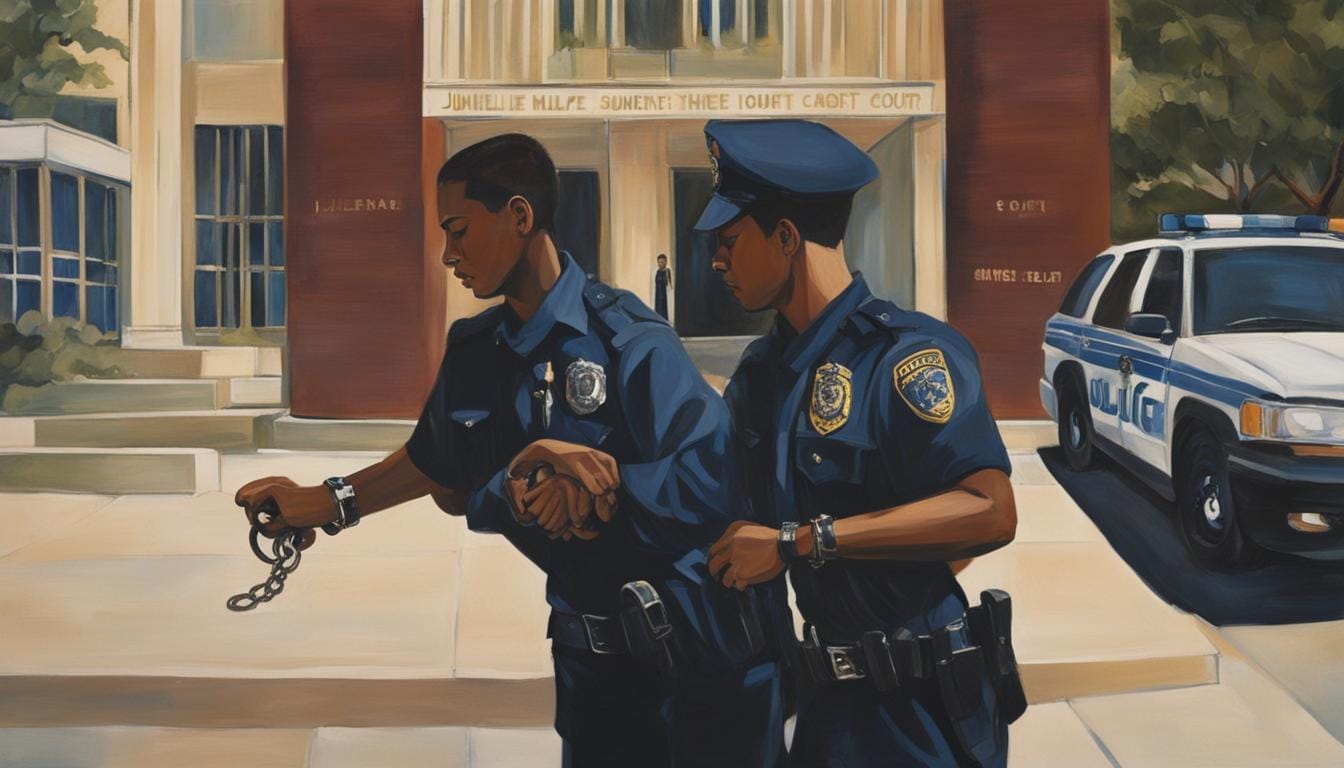When a juvenile is charged with assault in Texas, understanding the potential consequences is essential. The sentence for a juvenile in Texas can vary depending on several factors, including the nature of the assault and the juvenile’s previous record. It is crucial to be familiar with the laws, penalties, and sentencing guidelines for juvenile assault in Texas to navigate the juvenile justice system effectively.
In Texas, children aged between 10 and 16 are considered juveniles for criminal prosecution. When a juvenile is accused of committing a misdemeanor assault, they will be handled by a juvenile court or municipal court. Misdemeanor juvenile assaults in Texas can include assault by contact, assault by threat, assault bodily injury, and assault bodily injury against a family member.
The punishment for misdemeanor juvenile assault charges in Texas can include fines, probation, and placement in a residential or treatment facility. However, confinement in the Texas Juvenile Justice Department is not a possible punishment for misdemeanor juvenile assaults. Understanding the possible consequences for a juvenile assault conviction in Texas is crucial for both juveniles and their families.
It’s essential to be aware of the Texas statutes for juvenile assault and the available punishment options for a juvenile charged with assault. By understanding the intricacies of the Texas juvenile justice system, juveniles and their families can work towards the best possible outcome when facing assault charges. Whether it’s seeking legal representation or exploring defense strategies, being knowledgeable about the process can make a significant difference in securing a favorable resolution.
Stay tuned as we dive deeper into the definition of misdemeanor assault for juveniles in Texas and the specific penalties associated with each type of assault. We will also explore the common reasons for fights among teens and the possible defenses that can be raised in a juvenile assault case. Additionally, we’ll shed light on the importance of hiring an experienced juvenile assault defense attorney and how they can provide invaluable guidance and support throughout the legal process.
Remember, when it comes to juvenile assault charges in Texas, being well-informed is key to protecting the rights and future of the juvenile involved. Stay updated with our comprehensive guide on juvenile assault sentencing in Texas to ensure you have the knowledge you need to navigate this complex legal landscape.
Definition of Misdemeanor Assault for Juveniles in Texas
In Texas, misdemeanor assault offenses committed by juveniles encompass various actions that cause physical harm or the threat of bodily injury. These offenses include:
- Assault by contact
- Assault by threat
- Assault bodily injury
- Assault bodily injury against a family member
Let’s take a closer look at each type of assault offense:
Assault by Contact
Assault by contact occurs when a juvenile intentionally or knowingly causes offensive or provocative physical contact with another person. This can include acts such as pushing, poking, or slapping.
Assault by Threat
Assault by threat involves intentionally or knowingly threatening another person with imminent bodily injury. It can include verbal or non-verbal threats that create a reasonable fear of harm.
Assault Bodily Injury
Assault bodily injury occurs when a juvenile intentionally, knowingly, or recklessly causes bodily injury to another person. This offense involves actions that result in physical harm or pain, such as punching, kicking, or hitting with an object.
Assault Bodily Injury Against a Family Member
Assault bodily injury against a family member refers to intentionally, knowingly, or recklessly causing bodily injury to a parent, sibling, roommate, or boyfriend/girlfriend. It includes acts of physical violence within a domestic or familial context.
Understanding the range of misdemeanor assault offenses that apply to juveniles in Texas is crucial in comprehending the implications and potential consequences that follow these actions.
Punishment for Misdemeanor Juvenile Assault Charges
When a juvenile is charged with a misdemeanor assault in North Texas, there are various consequences and sentencing options to consider. The punishment for misdemeanor juvenile assault charges can include probation, fines, and, in certain cases, placement in a residential or treatment facility.
| Assault Offense | Punishment |
|---|---|
| Assault by Contact | Class C Misdemeanor Maximum $500 Fine |
| Assault by Threat | Class C Misdemeanor Maximum $500 Fine |
| Assault Bodily Injury | Class A Misdemeanor Probation and, in some cases, placement in a residential or treatment facility |
| Assault Bodily Injury against a Family Member | Class A Misdemeanor Probation and, in some cases, placement in a residential or treatment facility |
For first-time offenders, Deferred Prosecution Probation may be an option. If successfully completed, the charges can be dismissed. However, it’s important to note that confinement in the Texas Juvenile Justice Department is not a possible punishment for misdemeanor juvenile assault offenses.
It’s crucial for juveniles and their families to seek the guidance of an experienced juvenile assault defense attorney to navigate the legal process and work towards the best possible outcome.
Reasons for Fights Among Teens
Fights among teens can occur for various reasons, including:
- Bullying: Teens who experience bullying may retaliate physically to defend themselves or to assert their power.
- Peer Pressure: The desire to fit in with a certain group or to gain social acceptance can lead teens to engage in fights.
- Substance Abuse: Drug or alcohol abuse can impair judgment and increase aggression, leading to conflicts.
- Jealousy: Teenagers may fight over romantic interests, attention, or material possessions, fueled by feelings of envy or insecurity.
- Mental Health Issues: Teens struggling with mental health issues, such as anger or impulse control problems, may be more prone to physical altercations.
- Family Conflicts: Turbulent or dysfunctional family dynamics can spill over into the lives of teens, resulting in fights.
- Territorial Disputes: Disputes over personal space, possessions, or perceived infringements on territory can escalate into physical confrontations.
Understanding these factors is essential in addressing teen fights and implementing preventive measures.
Possible Juvenile Assault Defenses
When it comes to defending against juvenile assault charges, there are several possible defenses that can be raised. These defenses are important for protecting the rights and future of the accused juvenile. In order to establish a strong defense strategy, it is crucial to understand the potential defenses that may be applicable in a juvenile misdemeanor assault case.
1. Self-Defense
Self-defense is a common defense strategy in assault cases. If the accused juvenile reasonably believed that they were in imminent danger of harm and used force to protect themselves, this defense may be raised. It is important to establish that the force used was proportionate and necessary to defend against the perceived threat.
2. Defense of Property or a Third Person
In some cases, a juvenile may have used force to protect their property or another person from harm. This defense argues that the force used was justified in order to prevent the unlawful invasion of property or to defend another individual from harm. It is crucial to establish that the force used was reasonable in relation to the threat faced.
3. Consent/Mutual Combat
In situations where both parties willingly engaged in a physical altercation, the defense of consent or mutual combat may be applicable. This defense argues that both parties consented to engage in a fight, thus negating the element of criminal intent or assault.
4. Accident
If the alleged assault occurred unintentionally or as a result of an accident, this defense may be raised. It is important to establish that the accused juvenile did not act intentionally or knowingly in causing harm to another individual.
5. Lack of Evidence
In any criminal case, the burden of proof lies with the prosecution. If there is insufficient evidence to prove the accused juvenile’s guilt beyond a reasonable doubt, this defense may be raised. It is crucial to challenge the prosecution’s evidence and expose any weaknesses or inconsistencies in their case.
Each case is unique, and the viability of these defenses may vary depending on the specific circumstances. Consulting with an experienced juvenile assault defense attorney is essential for determining the most effective defense strategy for a particular case.
Importance of an Experienced Juvenile Assault Defense Attorney
When facing juvenile assault charges, it is crucial to have an experienced defense attorney specializing in juvenile assault cases. Hiring a skilled attorney who is well-versed in juvenile law can make all the difference in navigating through the complexities of the legal system and ensuring the protection of the juvenile’s rights.
An experienced defense attorney specializing in juvenile assault cases will possess in-depth knowledge of the specific laws, processes, and procedures pertaining to juveniles. This expertise allows them to craft effective defense strategies tailored to the unique circumstances of each case, increasing the chances of a favorable outcome.
Furthermore, an experienced defense attorney can explore alternative resolutions and diversion programs that may be available to juvenile offenders, helping to minimize the potential long-term consequences of a juvenile assault conviction.
Working with a skilled defense attorney also provides invaluable guidance and support throughout the entire legal process. They can help the juvenile and their family understand their rights, navigate court proceedings, and make informed decisions regarding the best course of action.
By hiring an experienced juvenile assault defense attorney, individuals can benefit from:
- Expertise in juvenile law and the juvenile justice system
- Knowledge of alternative resolutions and diversion programs
- Personalized defense strategies
- Guidance and support throughout the legal process
Ultimately, having a skilled defense attorney specializing in juvenile assault cases can greatly increase the likelihood of achieving the best possible outcome for the juvenile.
Conclusion
In conclusion, when it comes to juvenile assault charges in Texas, the focus is on rehabilitation and treatment rather than punishment. The juvenile justice system aims to help young offenders learn from their mistakes, address the underlying issues, and provide avenues for rehabilitation. Misdemeanor juvenile assaults can result in consequences such as probation, fines, or placement in residential or treatment facilities.
It is crucial for juveniles facing assault charges to have an experienced defense attorney who specializes in juvenile law. They can navigate the complex legal landscape, protect the rights of the juvenile, and ensure the best possible outcome. A skilled attorney will be well-versed in the specific laws and regulations surrounding juvenile assault charges and help guide the juvenile and their family through the legal process.
Being charged with juvenile assault in Texas is a serious matter, but there are opportunities for rehabilitation and growth. With the right legal representation and a commitment to personal growth, juveniles can move forward and avoid long-term negative consequences. It is important to understand the sentencing options and have the support and guidance of a knowledgeable defense attorney to protect the juvenile’s future.













